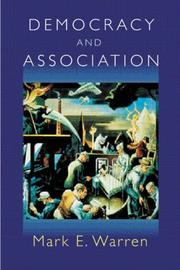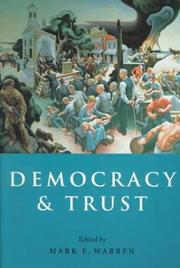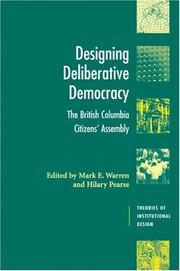| Listing 1 - 10 of 14 | << page >> |
Sort by
|
Book
ISBN: 0262231352 Year: 1988 Volume: vol *5 Publisher: Cambridge, Mass. MIT
Abstract | Keywords | Export | Availability | Bookmark
 Loading...
Loading...Choose an application
- Reference Manager
- EndNote
- RefWorks (Direct export to RefWorks)
Sociological theories --- Nietzsche, Friedrich W. --- 1 NIETZSCHE, FRIEDRICH --- Filosofie. Psychologie--NIETZSCHE, FRIEDRICH --- Nietzsche, Friedrich Wilhelm --- -Political and social views --- 1 NIETZSCHE, FRIEDRICH Filosofie. Psychologie--NIETZSCHE, FRIEDRICH --- Nietzsche, Friedrich --- Nietzsche, Friedrich Wilhelm, --- Nietzsche, Friederich --- Political and social views. --- Political and social views --- Nietzsche, Friedrich Wilhelm, 1844-1900 - Political and social views.

ISBN: 0691050775 069105035X 1400814790 Year: 2001 Publisher: Princeton : Princeton University Press,
Abstract | Keywords | Export | Availability | Bookmark
 Loading...
Loading...Choose an application
- Reference Manager
- EndNote
- RefWorks (Direct export to RefWorks)
This book offers the first systematic assessment of what associations do and don't do for democracy. Warren explains how and when associational life expands the domain, inclusiveness, and authenticity of democracy. He looks at which associations are most likely to foster individuals' capacities for democratic citizenship, provoke political debate, open existing institutions, guide market activities, or bring democratic decision-making to new venues. Throughout, Warren also considers the trade-offs involved, noting, for example, that organizational solidarity can dampen internal dissent and deliberation even as it enhances public deliberation. Tocqueville's view that a virtuous and viable democracy depends on robust associational life has become a cornerstone of contemporary democratic theory. Democratic theorists generally agree that issue networks, recreational associations, support circles, religious groups, unions, advocacy groups, and myriad other kinds of associations enhance democracy by cultivating citizenship, promoting public deliberation, providing voice and representation, and enabling varied forms of governance. Yet there has been little work to show how and why different kinds of association have different effects on democracy -- many supportive but others minimal or even destructive.
#SBIB:012.AANKOOP --- #SBIB:324H60 --- Democracy --- Associations, institutions, etc --- Institutions, associations, etc. --- Networks (Associations, institutions, etc.) --- Organizations --- Voluntary associations --- Voluntary organizations --- Social groups --- Voluntarism --- Self-government --- Political science --- Equality --- Representative government and representation --- Republics --- Politieke socialisatie --- Associations, institutions, etc. --- Democracy. --- Democratie. --- Associations --- Organisaties. --- Verenigingen. --- POLITICAL SCIENCE --- Associations. --- Aspect politique. --- Political Ideologies --- Administration --- Civil government --- Commonwealth, The --- Government --- Political theory --- Political thought --- Politics --- Science, Political --- Social sciences --- State, The --- Amnesty International. --- Bob Jones University v. United States. --- Catholic Church. --- Christian Coalition. --- Christian Right. --- Equal Rights Amendment. --- European Union. --- German Green Party. --- Human Rights Watch. --- Kaiser Family Foundation. --- Kettering Foundation. --- League of Women Voters. --- National Audubon Society. --- Nature Conservancy. --- New Social Movements. --- Offe, Claus. --- Parent Teachers Association (PTA). --- Religious Right. --- advocacy groups. --- affective communication. --- anomie. --- associational ecologies. --- authoritarianism. --- business associations. --- civic virtues. --- conflict. --- deliberation. --- differentiation. --- economic associations. --- efficacy. --- environmental groups. --- ethnicity. --- factions. --- fraternal orders. --- fundamentalism. --- globalization. --- goods of association. --- hate groups. --- identity politics. --- identity-based groups. --- institutional effects of associations. --- liberalism. --- loyalty. --- markets. --- multiculturalism. --- patriotic groups. --- pluralization. --- postmaterialism. --- radical democracy. --- secondary associations. --- secret societies. --- subsidiarity. --- Amicales --- Organisations --- Sociétés (associations) --- Vie associative --- National-socialisme et associations --- Réunions --- Presse associative --- Bénévolat --- Sociétés savantes et instituts --- Technique --- Associations féministes --- Missions --- Musique --- Confréries gastronomiques --- Instituts coloniaux --- Bibliothécaires --- Associations professionnelles --- Associations sans but lucratif --- Chômeurs --- Cinéma --- Clubs --- Conseils d'administration --- Comités --- Coopératives --- Cooptation --- Enseignants --- Femmes --- Hommes --- Liberté d'association --- Stations de radio associatives --- Littérature --- Sociétés secrètes --- Communautés (religion) --- Chaînes de télévision associatives --- Étudiants --- Confréries vineuses --- Philosophie --- Ligues des droits de l'homme --- Fédérations sportives --- Collèges (Rome) --- Société civile organisée --- Contribution au concept de démocratie --- Démocraties --- Et la démocratie --- Gouvernements démocratiques --- Nouvelles démocraties --- Régimes démocratiques --- Démocratie et sciences --- Égalité --- Femmes et démocratie --- Illibéralisme --- Liberté --- Peuple --- Représentation politique --- République --- Suffrage universel --- Démocratie --- Démocratie directe --- Démocratie électronique --- Démocratie liquide --- Démocratie locale --- Démocratie participative --- Démocratisation --- Droit des peuples à disposer d'eux-mêmes --- Régimes représentatifs --- Régimes politiques --- Idées politiques --- Religion

ISBN: 0521646871 0521640830 0511659954 9780521646871 9780521640831 9780511659959 Year: 1999 Publisher: Cambridge Cambridge University Press
Abstract | Keywords | Export | Availability | Bookmark
 Loading...
Loading...Choose an application
- Reference Manager
- EndNote
- RefWorks (Direct export to RefWorks)
Surveys suggest an erosion of trust in government, among individuals, and between groups. Although these trends are often thought to be bad for democracy, the relationship between democracy and trust is paradoxical. Trust can develop where interests converge, but in politics interests conflict. Democracy recognizes that politics does not provide a natural terrain for robust trust relations, and so includes a healthy distrust of the interests of others, especially the powerful. Democratic systems institutionalize distrust by providing many opportunities for citizens to oversee those empowered with the public trust. At the same time, trust is a generic social building block of collective action, and for this reason alone democracy cannot do without trust. At a minimum, democratic institutions depend on a trust among citizens sufficient for representation, resistance, and alternative forms of governance. Bringing together social science and political theory, this book provides a valuable exploration of these central issues.
Political sociology --- Confiance --- Democracy --- Democratie --- Démocratie --- Inspraak in het beleid --- Overlegcultuur --- Self-government --- Trust --- Vertrouwen --- #SBIB:324H20 --- #SBIB:003.IO --- #SBIB:35H500 --- Trust (Psychology) --- Attitude (Psychology) --- Emotions --- Political science --- Equality --- Representative government and representation --- Republics --- Politologie: theorieën (democratie, comparatieve studieën….) --- Bestuur en samenleving: algemene werken --- Democracy. --- Trust. --- Political psychology --- Public opinion --- Aspect politique. --- Social Sciences --- Political Science --- Representative government and representation - Public opinion --- Démocratie

ISBN: 9780521885072 0521885078 9780511491177 9780521712071 0521712076 1107186455 9786611255091 0511387903 0511386915 0511491174 0511383231 1281255092 0511385080 0511388896 Year: 2008 Publisher: Cambridge Cambridge University Press
Abstract | Keywords | Export | Availability | Bookmark
 Loading...
Loading...Choose an application
- Reference Manager
- EndNote
- RefWorks (Direct export to RefWorks)
Is it possible to advance democracy by empowering ordinary citizens to make key decisions about the design of political institutions and policies? In 2004, the government of British Columbia embarked on a bold democratic experiment: it created an assembly of 160 near-randomly selected citizens to assess and redesign the province's electoral system. The British Columbia Citizens' Assembly represents the first time a citizen body has had the power to reform fundamental political institutions. It was an innovative gamble that has been replicated elsewhere in Canada and in the Netherlands, and is gaining increasing attention in Europe as a democratic alternative for constitution-making and constitutional reform. In the USA, advocates view citizens' assemblies as a means for reforming referendum processes. This book investigates the citizens' assembly in British Columbia to test and refine key propositions of democratic theory and practice.
Representative government and representation --- Elections British Columbia. --- Representative government and representation - British Columbia --- Social Sciences --- Political Science --- Democracy --- British Columbia. --- British Columbia --- Politics and government --- Self-government --- Political science --- Equality --- Republics --- Parliamentary government --- Political representation --- Representation --- Constitutional history --- Constitutional law --- Elections --- Suffrage --- Colombie-Britannique --- British Columbia (Colony) --- Colony of British Columbia --- United Colonies of Vancouver Island and British Columbia --- Brits-Kolombië --- Britaniya Kolumbiyası --- Брытанская Калумбія --- Brytanskai︠a︡ Kalumbii︠a︡ --- Britanska Kolumbija --- Британска Колумбия --- Britanska Kolumbii︠a︡ --- Colúmbia Britànica --- Britská Kolumbie --- Britisk Columbia --- Britisch-Kolumbien --- Briti Columbia --- Βρετανικη Κολομβια --- Vretanikē Kolomvia --- Province of British Columbia --- B.C. (British Columbia) --- BC --- C.-B. (Province) --- Vancouver Island (Colony) --- Electoral politics --- Franchise --- Polls --- Politics, Practical --- Plebiscite --- Political campaigns
Book
ISBN: 9780199751259 9780199751242 Year: 2010 Publisher: Oxford Oxford University Press
Abstract | Keywords | Export | Availability | Bookmark
 Loading...
Loading...Choose an application
- Reference Manager
- EndNote
- RefWorks (Direct export to RefWorks)
Sociology of minorities --- Community organization --- United States of America
Book
ISBN: 1852600225 Year: 1988 Publisher: Wellingborough, Northamptonshire, England : New York, N.Y. : P. Stephens ; Distributed by Sterling Pub. Co.,
Abstract | Keywords | Export | Availability | Bookmark
 Loading...
Loading...Choose an application
- Reference Manager
- EndNote
- RefWorks (Direct export to RefWorks)
Book
ISBN: 9781400823925 Year: 2021 Publisher: Princeton, NJ
Abstract | Keywords | Export | Availability | Bookmark
 Loading...
Loading...Choose an application
- Reference Manager
- EndNote
- RefWorks (Direct export to RefWorks)
Book
ISBN: 9781400832040 Year: 2010 Publisher: Princeton, NJ
Abstract | Keywords | Export | Availability | Bookmark
 Loading...
Loading...Choose an application
- Reference Manager
- EndNote
- RefWorks (Direct export to RefWorks)
Book
ISBN: 0199751250 128270284X 9786612702846 0199780293 Year: 2010 Publisher: New York : Oxford University Press,
Abstract | Keywords | Export | Availability | Bookmark
 Loading...
Loading...Choose an application
- Reference Manager
- EndNote
- RefWorks (Direct export to RefWorks)
Fire in the Heart uncovers the dynamic processes through which some white Americans become activists for racial justice. The book reports powerful accounts of the development of racial awareness drawn from in-depth interviews with fifty white activists in the fields of community organizing, education, and criminal justice reform. Drawing extensively on the rich interview material, Mark Warren shows how white Americans can develop a commitment to racial justice, not just because it is the right thing to do, but because they embrace the cause as their own. Contrary to much contemporary thinking
Race discrimination --- Racism --- White people --- Social action --- Attitudes. --- United States --- Race relations. --- Whites
Book
ISBN: 0197611540 0197611532 Year: 2022 Publisher: New York, New York : Oxford University Press,
Abstract | Keywords | Export | Availability | Bookmark
 Loading...
Loading...Choose an application
- Reference Manager
- EndNote
- RefWorks (Direct export to RefWorks)
In Willful Defiance, by Mark R. Warren tells the story of how Black and Brown parents and students organized to dismantle the school-to-prison pipeline in their local schools and built a movement that spread across the country. He examines organizing processes in Mississippi, Los Angeles, Chicago, and other localities, showing how parents and students of color changed exclusionary discipline policies that suspend and expel students of color at disproportionate rates and policing practices that lead students into the juvenile and criminal justice systems. The book documents the struggle to build a movement led by community groups rather than Washington-based professional advocates and offers a new model for federated movements that win policy changes to transform deep-seated and systemic racism in public schools and broader society.
Racism in education --- Discrimination in school discipline --- At-risk youth --- Youth with social disabilities --- Juvenile delinquency --- Discrimination in juvenile justice administration --- Educational change --- Education --- Education --- Prevention.
| Listing 1 - 10 of 14 | << page >> |
Sort by
|

 Search
Search Feedback
Feedback About UniCat
About UniCat  Help
Help News
News